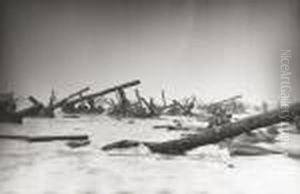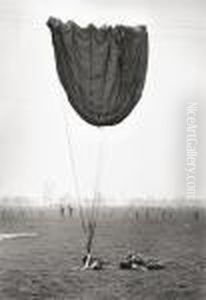Robert Capa Paintings
Robert Capa, born Endre Ernő Friedmann on October 22, 1913, in Budapest, Hungary, was a Jewish-Hungarian combat photographer and photojournalist who gained international renown for his gripping and courageous war photography. Capa's work is celebrated for its raw, authentic depiction of the horrors of war, capturing the human dimension of conflicts. He is perhaps best known for his coverage of five wars: the Spanish Civil War, the Second Sino-Japanese War, World War II across Europe, the 1948 Arab-Israeli War, and the First Indochina War. His ethos, encapsulated in his famous adage, "If your pictures aren't good enough, you're not close enough," underscores the danger and intimacy of his work.
Capa's early life was marked by political unrest; his opposition to the authoritarian regime in Hungary forced him to flee to Berlin at the age of 18, where he first became involved with photography. With the rise of Adolf Hitler, he moved to Paris, where he met and collaborated with other photographers, including his partner Gerda Taro. Together, they invented the persona of Robert Capa as a famous American photographer, a ruse that allowed them to sell their work more easily. It was during the Spanish Civil War that Capa took his most famous photograph, "The Falling Soldier," which captures the moment of a soldier's death and has since become an iconic image of the conflict.
Throughout World War II, Capa worked for various magazines, including Life, and was with the Allied forces during the D-Day invasion of Normandy in 1944, capturing images that would define the brutality and heroism of the day. Despite the loss of almost all his D-Day negatives to a darkroom accident, the surviving images remain some of the most powerful and enduring records of the invasion.
After the war, Capa continued to document conflicts around the world, co-founding the Magnum Photos cooperative in 1947 with Henri Cartier-Bresson, David Seymour, William Vandivert, and George Rodger. This organization was created to manage the work and rights of photographers, giving them greater control over their images. Capa's career, however, was cut tragically short when he stepped on a landmine and was killed on May 25, 1954, in Thai Binh, Indochina, now Vietnam, while covering the First Indochina War.
Robert Capa's legacy extends beyond his photographs; he is remembered as a pioneer of photojournalism and a man who sought to capture the truth of war, insisting on the importance of being a witness to history. His work has inspired generations of photographers and continues to hold a mirror to the complexities and moral dilemmas of armed conflict.

